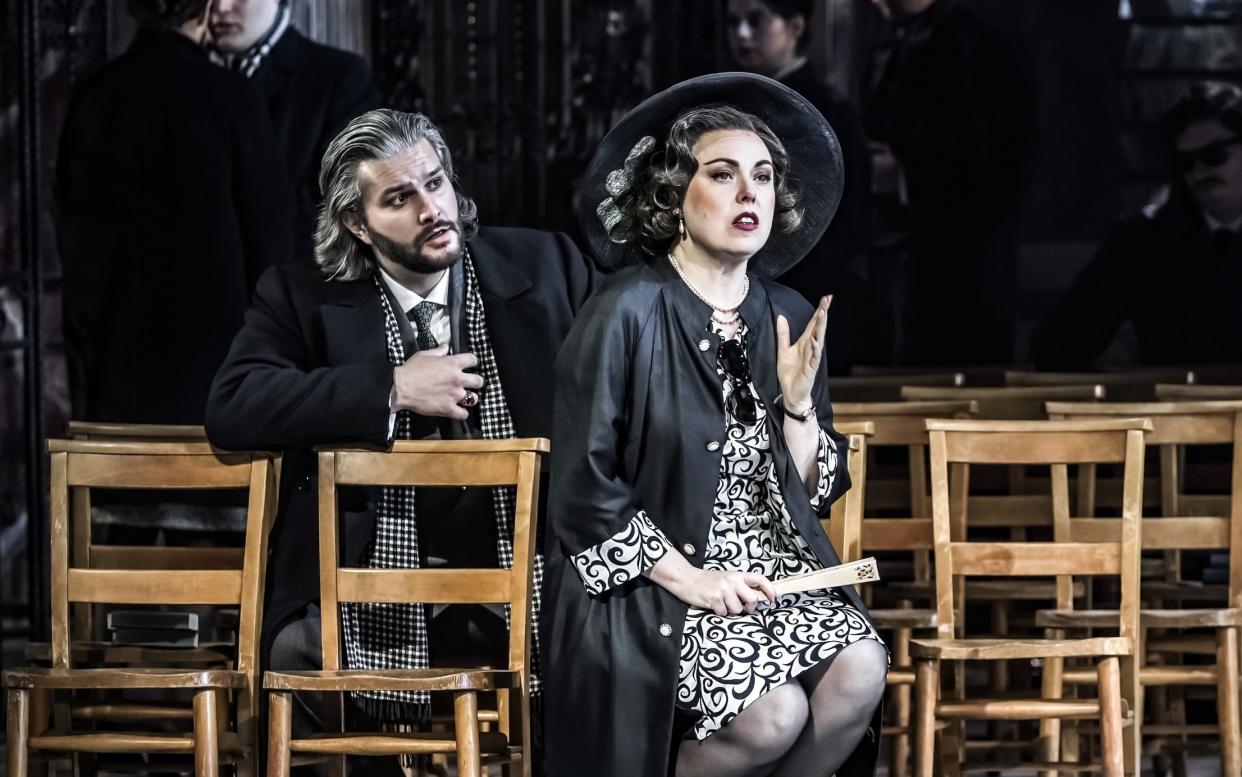Tosca, The Grange Festival, review: brings out the hard-hitting violence of Puccini’s writing

Tosca’s final plunge from the battlements is a reverse flip; her beloved Cavaradossi is shot not by a firing squad but by a single bullet; the oppressive Baron Scarpia keeps a handy torture chamber hidden in the floor by his desk – apart from these few revelations, there is not too much original in Christopher Luscombe’s new production of Puccini’s opera, which sticks, in sets by Simon Higlett, resolutely to the geography of the Rome original.
No complaints there, Puccini thoroughly researched the locales for his 1900 opera – literally evoking the sounds of specific surroundings was a feature of those operatic times. Only in Higlett’s final-act Castello Sant’Angelo does the set feel too oppressive, featuring the prison but leaving Puccini’s open-countryside prelude with its evocative boy treble (Sion Llywelyn-Davies) stranded in the orchestra pit.
In any case, every production of Puccini’s much-criticised but eternally popular score has something new to reveal, and here it was the sheer hard-hitting violence of so much of the orchestral writing that hit home: under conductor Francesco Cilluffo the strings of the Bournemouth Symphony Orchestra took a while to cohere, but in the brutal conflict between Tosca and Scarpia in Act II, as she prepared his death, they acquired an elemental depth and sonority.
In a close juxtaposition with Monteverdi’s Poppea, heard yesterday, Italian opera has, 250 years later, been completely transformed: recitative text-based drama, lightly accompanied, has turned into orchestrally dominated outbursts that create all the atmosphere and so much of the substance of the music. Singers can often struggle to be heard over these vivid textures, but on this occasion a trio of leads in the medium-size setting of the Grange Festival managed to communicate forcefully.
Andrew Manea’s Scarpia is not a conventional booming brutish baritone, but a rather sophisticated and sinister figure who knows – until his final moments – that he is in control of proceedings. Andrés Presno’s ardent artist, Cavaradossi, is a bushy-haired innocent, sometimes vocally pushed too hard, but infinitely touching in his final aria, “E lucevan le stelle”; one is even inclined to forgive him his insipid painting of Mary Magdalene, glimpsed in Act I in the church of Sant’Andrea della Valle. He is tall and bulky, and makes an unlikely couple with the remarkable Francesca Tiburzi as Floria Tosca, who is small but fierce, beginning rather coyly but erupting with concentrated power.
Making her debut at the festival, Tiburzi is an Italian Puccini specialist who understands the genre perfectly; her pitch is not always perfectly controlled in her self-pitying aria “Vissi d’arte”, but her outbursts of anger are both thrilling and truly terrifying. Scarpia manages to remove her gown but not her spiritual strength, and after killing him, she struggles to light a recalcitrant candle by his body (I dare say its reluctance was not in the script).
There are lively choirboy scenes from the Festival Children’s Chorus, a tolerant-church Sacristan from Darren Jeffrey, plus Dan D’Souza as the political prisoner Angelotti, and a slew of mafioso attendants around Scarpia. For Puccini, the ongoing politics are always secondary to the basic narrative, and this story ends bluntly on the battlements of the castle.
To July 5; thegrangefestival.co.uk


